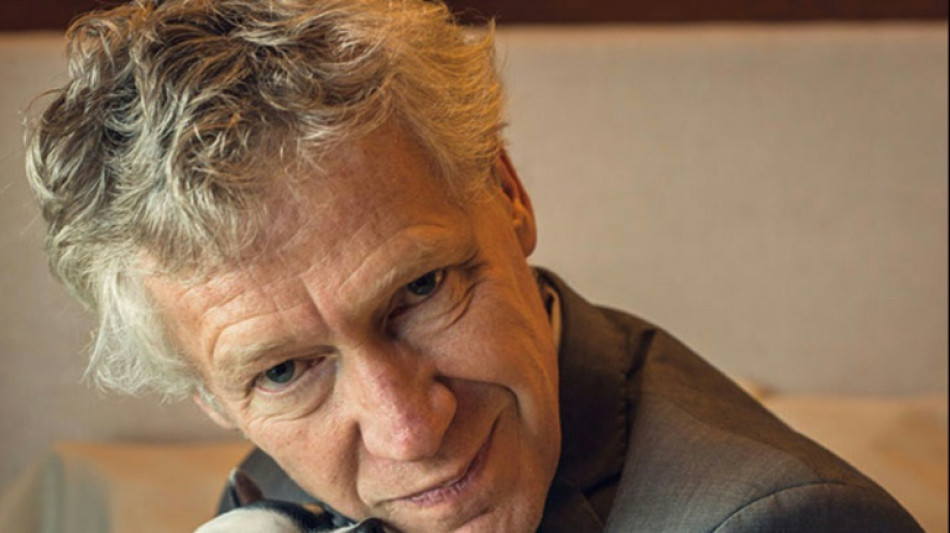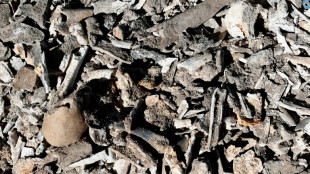
-
 Godolphin in full bloom as Desert Flower wins 1000 Guineas
Godolphin in full bloom as Desert Flower wins 1000 Guineas
-
Almeida wins Tour de Romandie as Evenepoel claims closing time-trial

-
 Bolsonaro leaves hospital three weeks after abdominal surgery
Bolsonaro leaves hospital three weeks after abdominal surgery
-
Man Utd crash at Brentford, Isak rescues Newcastle

-
 Romanians vote in tense presidential rerun as far right eyes win
Romanians vote in tense presidential rerun as far right eyes win
-
Lyon see off Racing to set up Challenge Cup final against Bath

-
 Kolkata survive Parag's six-hitting blitz to clinch IPL thriller
Kolkata survive Parag's six-hitting blitz to clinch IPL thriller
-
Israel vows retaliation against Yemen's Huthis over airport attack

-
 Mbappe maintains Real Madrid Liga dream in Celta thriller
Mbappe maintains Real Madrid Liga dream in Celta thriller
-
UNESCO says Nicaragua quitting over press prize award

-
 Church donation box goes digital in Greece
Church donation box goes digital in Greece
-
Germans mark liberation of Ravensbrueck Nazi camp

-
 Missile hits Israel airport area in Huthi-claimed attack
Missile hits Israel airport area in Huthi-claimed attack
-
DeChambeau eyes PGA Championship battle after South Korea LIV win

-
 Chinese president to visit Russia on May 7-10: Kremlin
Chinese president to visit Russia on May 7-10: Kremlin
-
'We don't care': weddings go on in Pakistan's Kashmir border

-
 Missile hits Israel airport area in attack claimed by Yemen's Huthis
Missile hits Israel airport area in attack claimed by Yemen's Huthis
-
Mexican mayor arrested in probe of alleged drug cartel ranch: govt source

-
 Seven Iranians among eight arrested in UK counterterrorism probes
Seven Iranians among eight arrested in UK counterterrorism probes
-
Israel says area of airport hit after Yemen missile launch

-
 Romanians return to polls as far right hopes to win presidential rerun
Romanians return to polls as far right hopes to win presidential rerun
-
4 Iranians among 5 arrested in UK for 'terrorism offences': police

-
 'Two million' throng Lady Gaga concert at Rio's Copacabana
'Two million' throng Lady Gaga concert at Rio's Copacabana
-
India-Pakistan gunfire triggers terror of past conflict

-
 UK hard right sets sights high after local election triumphs
UK hard right sets sights high after local election triumphs
-
Sexual abuse of nuns: one of the Catholic Church's last taboos

-
 West German foothold of far-right AfD shows challenge for Merz
West German foothold of far-right AfD shows challenge for Merz
-
Maldives president holds record 15-hour press conference

-
 'Accept me': Near Ukraine front, a haven for outcasts
'Accept me': Near Ukraine front, a haven for outcasts
-
Canelo Alvarez unifies super middleweight titles on Saudi Arabia debut

-
 Canelo Alvarez unifes super middleweight titles on Saudi Arabia debut
Canelo Alvarez unifes super middleweight titles on Saudi Arabia debut
-
US Fed expected to pause cuts again and wait for clarity on tariffs

-
 Ex-Liverpool star Firmino 'proud' after more Champions League history
Ex-Liverpool star Firmino 'proud' after more Champions League history
-
Australian PM basks in win, vows 'orderly' government

-
 Qataris hooked on traditional fishing competition
Qataris hooked on traditional fishing competition
-
Mozart chocolate row leaves bitter taste in Austria

-
 US solar tariffs could drive Asia transition boom
US solar tariffs could drive Asia transition boom
-
Four-try Hurricane Sullivan says revenge fuelled Chiefs upset

-
 Nuggets rout Clippers to advance in NBA playoffs
Nuggets rout Clippers to advance in NBA playoffs
-
Scheffler shines in dark for eight-shot CJ Cup Byron Nelson lead

-
 Romania returns to polls after annulled presidential vote
Romania returns to polls after annulled presidential vote
-
Easy vote turns Musk's dreams for Starbase city in Texas into reality

-
 Messi and Miami bounce back with 4-1 crushing of Red Bulls
Messi and Miami bounce back with 4-1 crushing of Red Bulls
-
US researchers seek to legitimize AI mental health care

-
 Ryu clings to two-shot lead at LPGA Black Desert Championship
Ryu clings to two-shot lead at LPGA Black Desert Championship
-
Ledecky, Walsh cap Pro Swim meet with world records

-
 Sovereignty rules in 151st Kentucky Derby
Sovereignty rules in 151st Kentucky Derby
-
New to The Street Acquires 15% Equity Stake in CommercialVille, Launches National Media Campaign Featuring Patent-Backed Platform

-
 Prometheus Laboratories Presents Novel Data on Precision-Guided Care in IBD at DDW(R) 2025
Prometheus Laboratories Presents Novel Data on Precision-Guided Care in IBD at DDW(R) 2025
-
McLaughlin-Levrone sets world's fastest of year in 400m hurdles


Frenchman rewarded for lifetime of research into narcolepsy
Emmanuel Mignot is one of the world's leading experts on narcolepsy, a sleep disorder that he finds both "strange" and "fascinating."
The French-born Mignot has dedicated his life to studying the causes of narcolepsy and shedding light on one of the great biological mysteries -- sleep.
His discovery of the genetic and molecular causes of the disorder led to his receiving a prestigious Breakthrough Prize on Thursday along with Japan's Masashi Yanagisawa, who made related findings around the same time.
Because of their discoveries, new treatments for narcolepsy -- which causes people to suddenly fall asleep -- and other sleep disorders are being developed.
About one in every 2,000 people suffers from narcolepsy. Some may experience catalepsy -- a sudden trance-like state.
"I am quite proud because what I have discovered is making an enormous difference for my patients," Mignot said in a telephone interview with AFP. "It's the best reward that one could receive."
The 63-year-old Mignot is a sleep researcher at Stanford University in California.
Thirty years ago, when he was a medical student, Mignot fulfilled his military service requirements in France by coming to Stanford to study a French-made drug that was being used to treat narcolepsy.
At the time, he said, the disease was "virtually unknown" and no one was actively studying it.
He became "completely fascinated."
"I told myself it's incredible, this disease, people fall asleep all the time, we have no idea why, and if we could discover the cause we might understand something new about sleep."
Stanford was already home to a renowned sleep center and its laboratory housed narcoleptic dogs, which Mignot began studying in an effort to find a genetic cause of the disease.
Genome sequencing was very primitive at that time and "everybody told me I was crazy," said Mignot, who currently has an adopted narcoleptic dog called Watson.
"I thought it would take a few years and it ended up taking 10."
In 1999, Mignot found a mutation in the genome of narcoleptic dogs. It was located on membrane receptors in the brain that respond to molecules outside the cell, similar to a lock and a key.
- 'Remake a key' -
The Japanese scientist Yanagisawa, meanwhile, had been studying orphan receptors -- receptors of unknown function -- in mice.
He discovered that a molecule that he named orexin binds to the same receptor Mignot detected as abnormal in dogs.
Mice who were deprived of orexin developed narcolepsy.
Mignot immediately began research on human subjects and found that orexin levels in the brain of narcolepsy patients were zero.
Normally, the molecule is produced in great quantities during the day, especially in the evening, allowing one to fight fatigue.
"You don't make a discovery like this twice in your life," Mignot said. "We found the cause of a disease.
"The advantage, is that we can remake a key," he said, referring to orexin.
For the moment, most patients are treated with a combination of powerful sedatives to help them sleep more soundly and amphetamines to keep them awake during the day.
Mignot said tests using a drug that mimics orexin have been "really miraculous."
Patients are fully awake and "transformed."
The challenge is to develop the right dose to be delivered at the right time.
Several companies, including Takeda of Japan, are working on it, and drugs could be authorized in the next few years.
They could be applied to other patients -- people suffering from depression, for example -- who have difficulty waking up, or to those in a coma.
Mignot meanwhile is studying whether narcolepsy may be caused by a flu virus.
The body's immune system may be confusing a flu virus with the cells that produce orexin and T-cells that fight infection are attacking them as a result.
"I've become interested in how the immune system works in the brain," a field he said is "beginning to explode."
As for sleep, Mignot remains fascinated by it even if he has uncovered one of the great mysteries.
"What is it that sleep does that it is so important that we have to do it every day?" he asked. "It's true that we still don't know."
P.Santos--AMWN

